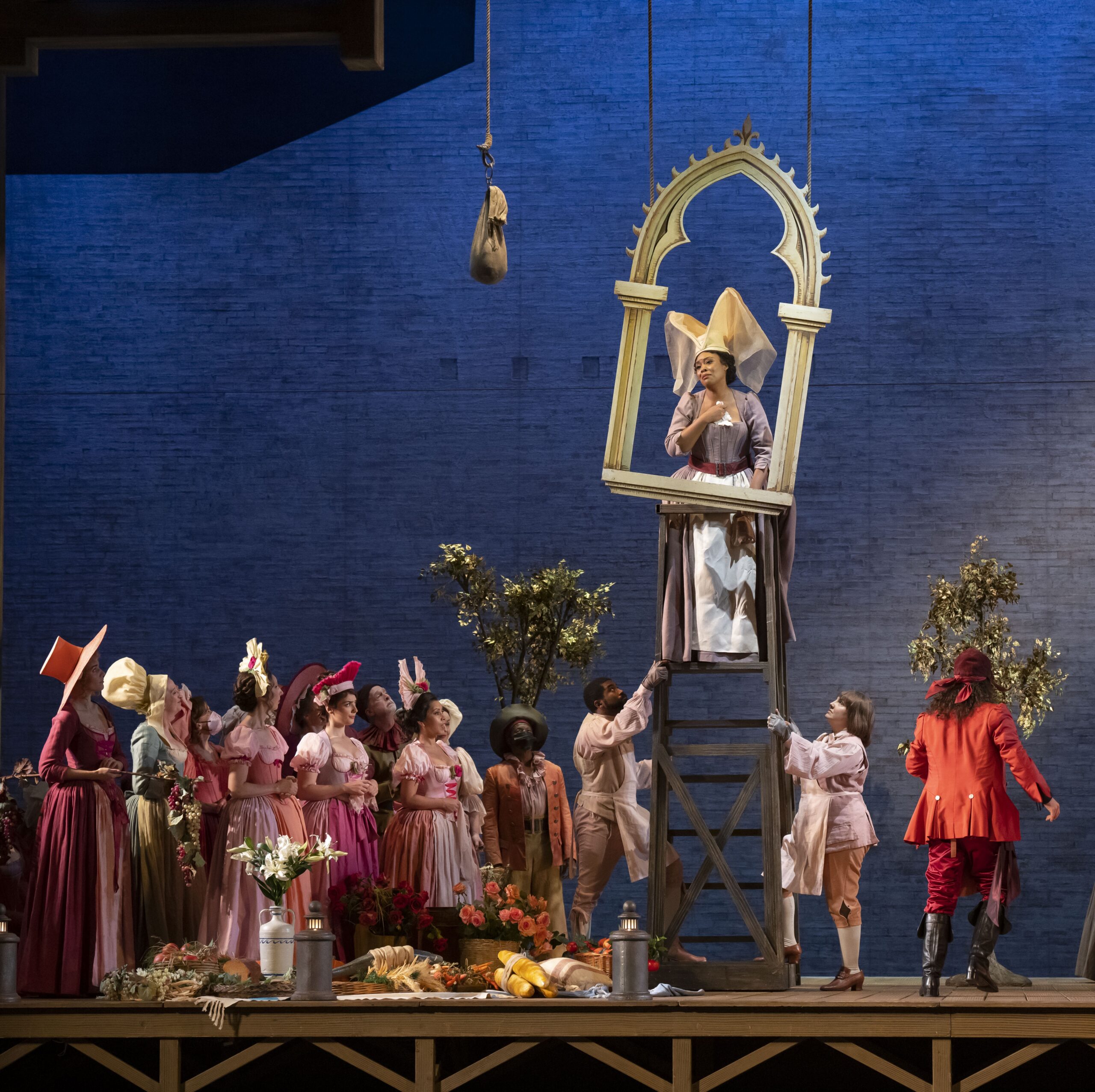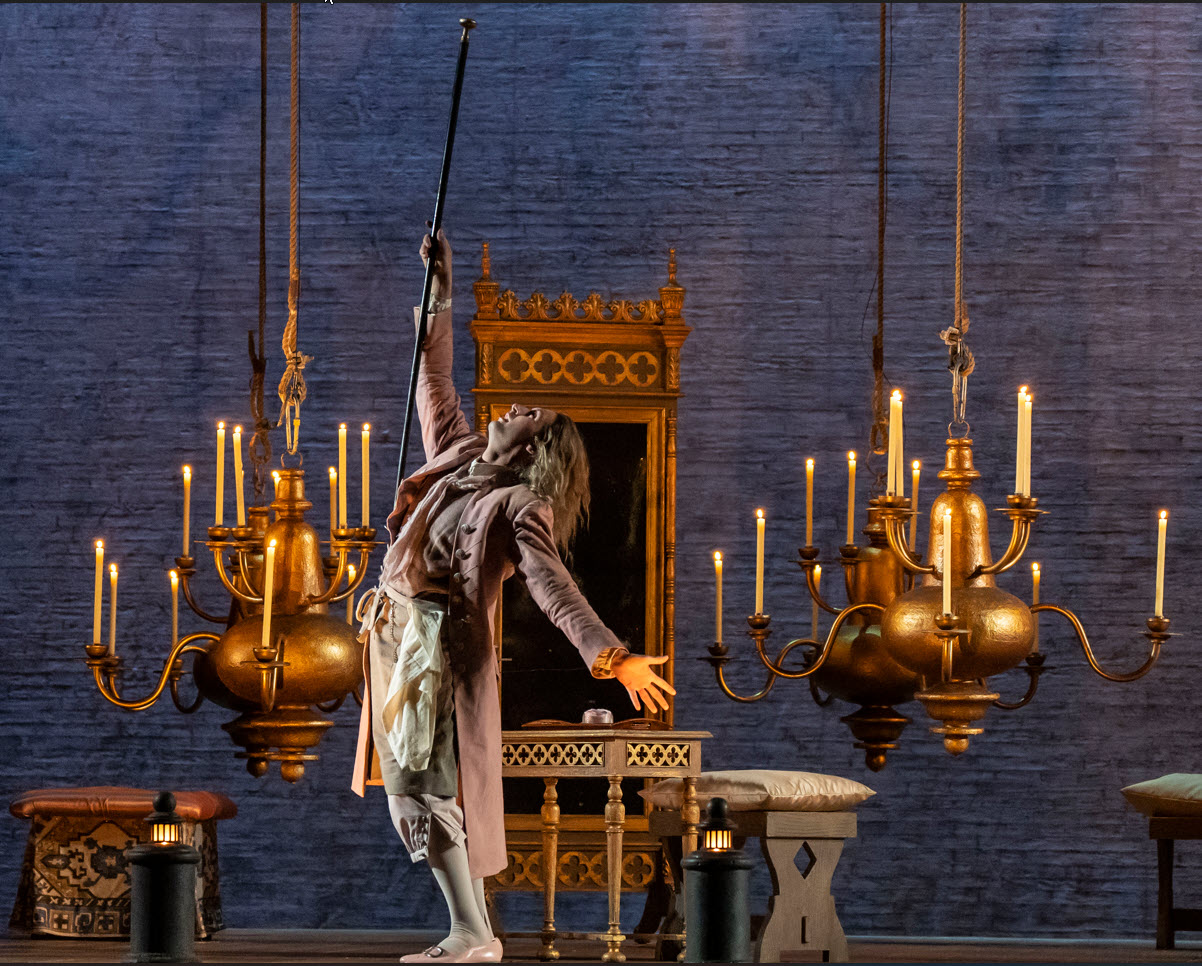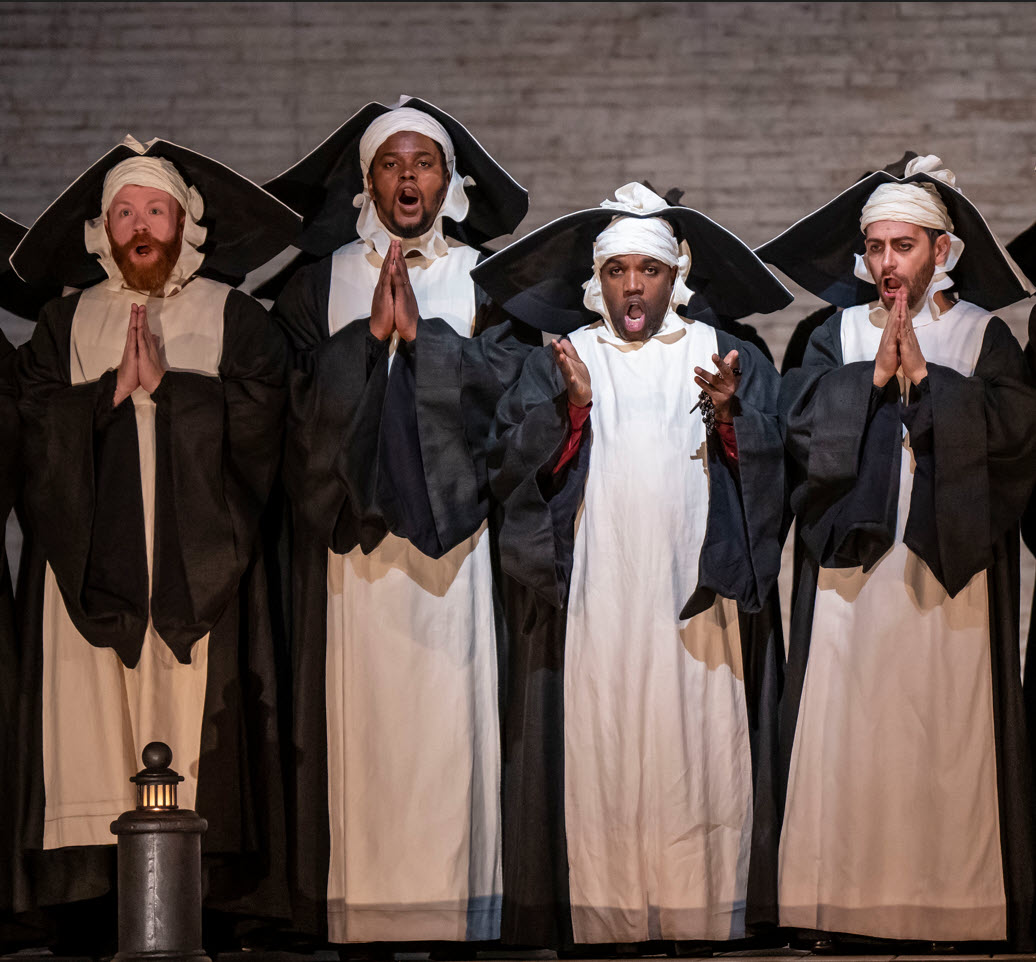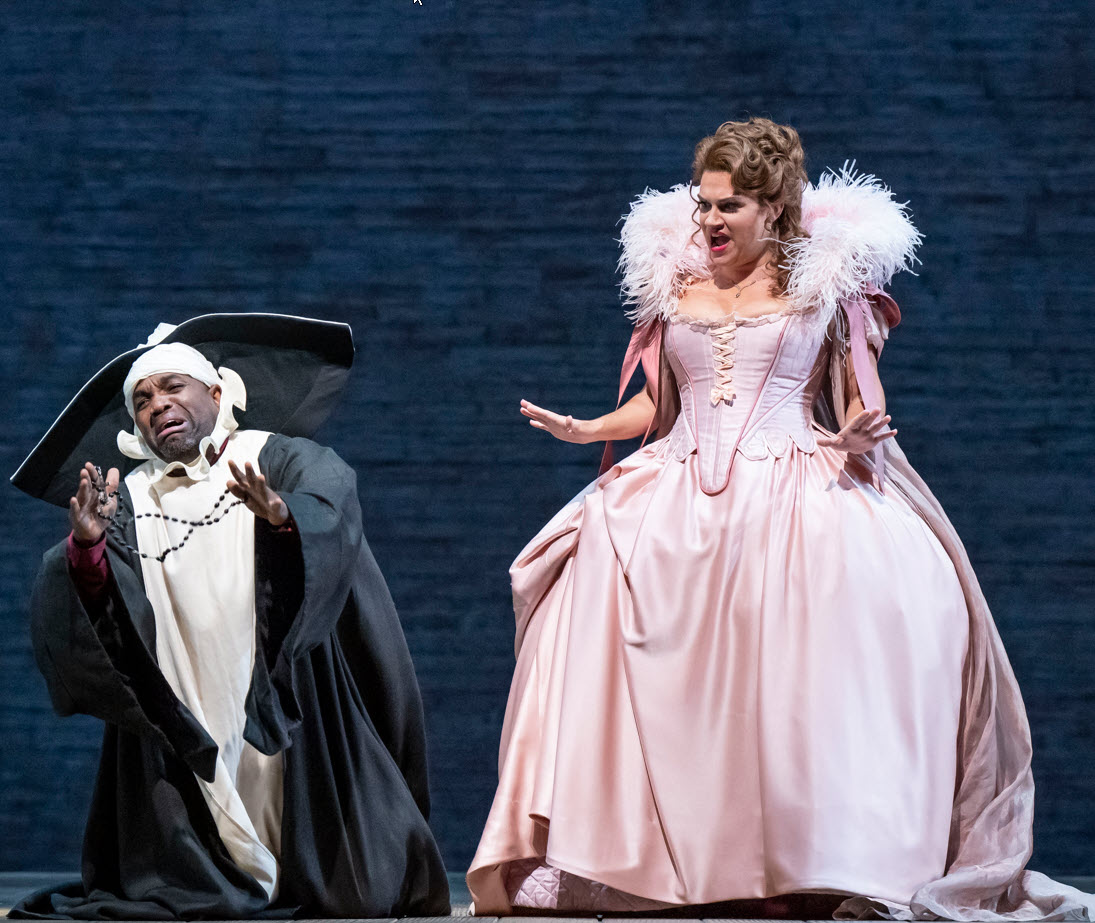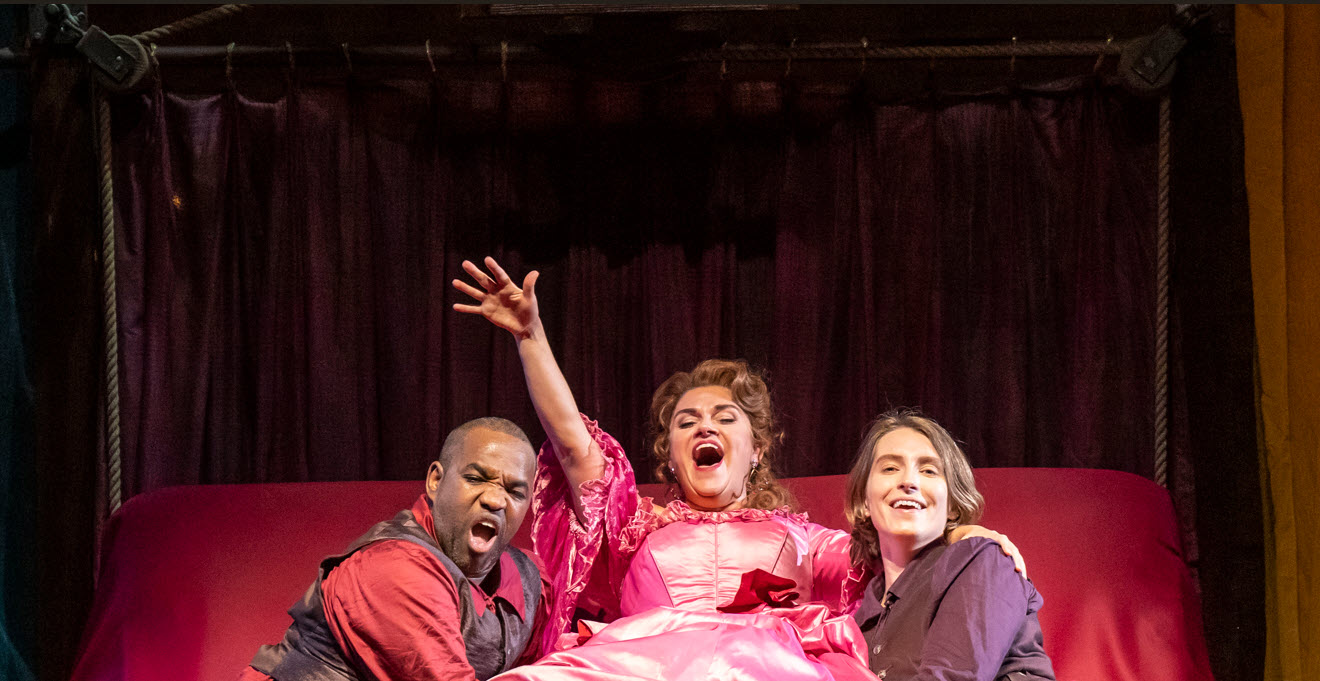Lyric Opera’s bright and funny ‘Le Comte Ory’ confirmed the company’s return to full vigor
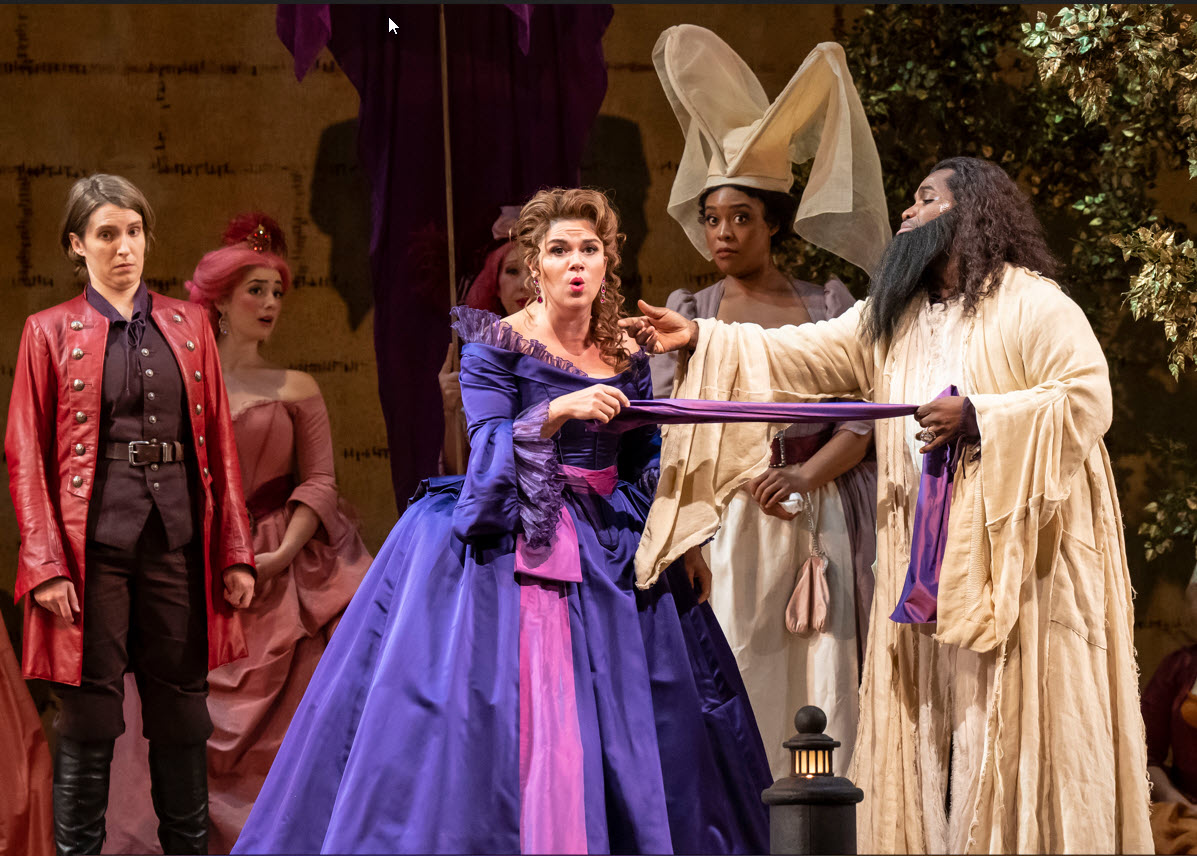
“All your wishes will come true,” promised a supposedly holy hermit, actually tenor Lawrence Brownlee as the rascal Count Ory, in disguise. Countess Adèle (Kathryn Lewek) and her page (Kayleigh Decker, left) weren’t buying. (Lyric photos by Todd Rosenberg)
Commentary: Smart staging, Enrique Mazzola’s stylish conducting and superb cast showcased Lyric’s post-Covid resiliency.
By Nancy Malitz
“Is this a good idea?” I asked myself, as I watched a parade of grade-schoolers walk by me at the Lyric Opera of Chicago, and I thought about the bedroom brouhaha that Rossini had planned for the comedic high point of his opera “Le Comte Ory.”
Not to worry. Bartlett Sher’s Metropolitan Opera production, designed by Michael Yeargan and revived here by Kathleen Smith Belcher, entailed an impeccable stunt of Three Stooges-style antics while everyone remained fully clothed. The high-pitched laughter of children floated from the balcony like glitter in the house.
No Chicago arts presenter deserves the success of its current season more than Lyric Opera, which in March of 2020 was forced, by the onset of Covid, to cancel its “Ring” cycle, a gargantuan undertaking involving Richard Wagner’s four-chapter mythical saga about gods and giants and dragons and flying female warriors, oh my. Typically, a complete “Ring” cycle takes place over a single week, so that tourists can come from all over the world and make a holiday of this musical feast.
But it was not to be. Lyric’s “Ring” was put into storage, as opera companies around the world went into surreal Zoom warp, hunting around for projects that could still work, given the urgent distancing requirements and safety concerns affecting singers and stage crews in close proximity.
Lyric has managed these challenges better than most. Chicago’s opera crowd, old and young, was clearly delighted in a performance of “Le Comte Ory” I saw on Nov. 16, partway into the Thanksgiving run. Sher’s Met production was deftly revived here. Lyric music director Enrique Mazzola whipped up a mirthful froth in the orchestra pit.
Sher’s three-way play within a play within a play scheme got an assist from the latest in 13th-century technology: Circling a simple square platform of raised wooden planks, a silent stage manager (Kirk Osgood) puttered throughout the overture with his rope-and-pulley system that could drop a window frame or a door stoop into place just long enough for some character to look or walk through. Candelabras required an entire repertoire of stage maintenance schtick. And a mere spindle of a tree, easily dragged around, stands in for the vast castle grounds of Countess Adèle and her retinue. In all, it was a charming setting for a silly saga. Rossini’s opera has the easy sparkle of Mozart’s at his cleverest.
The story is set in the year 1200 or thereabouts. (Lyric called it Far Away and Long Ago.) The confident lothario, Count Ory, first appears on the grounds of the Formoutiers castle with his men, fellow “holy hermits” offering consolation and wish fulfillment, even as the castle’s men are away fighting in the Fourth Crusades. Thanks to Ory’s bawdy buddies, the ruse quickly fails. But this randy bunch is back in Act 2, impersonating nuns.
With impressive vocal antics and high wit, tenor Lawrence Brownlee hit his sparkling high C’s (and above!) as the lascivious Ory in hilarious disguises. Both soprano Kathryn Lewek, as the Countess Adèle, and mezzo-soprano Kayleigh Decker, as her feisty young page Isolier, parried with fireworks of their own. But they captured moments of tenderness, too.
The action heats up as Ory and his fellow “nuns” mince about in wimples and tunics, begging for protection from Ory’s notorious ruffians (which is precisely who they are in disguise.) Willy-nilly, these rapscallions invade the castle’s cellar for some serious sampling of the estate’s vineyard bounty, which leads to a tipsy chorus or two. It is left to Adèle’s adoring page – Decker is completely believable in her “trouser” role – and to Adèle’s loyal companion Ragonde (warm-voiced mezzo-soprano Zoie Reams) to contrive countermeasures.
Lewek, who has made a career as Mozart’s Queen of the Night and possesses considerable pyrotechnical skill, was deliciously convincing as the introspective countess who takes command with resolute dignity, and soon enough, with gusto. Summoning the courage to fight audacity with audacity, she approves the bed prank this Count so clearly deserves, bringing on the mayhem that provoked repeated peals of laughter in the house. What a delicious sound.
Decker’s take on the adolescent page, who has a painful crush on his mistress, was infectiously sweet and technically top notch. A former member of Lyric’s training arm, the Ryan Center, she has emerged in command of this career-defining role.Adèle private bedchamber is, of course, Ory’s singular goal from first to last.
If some of his daffy antics seem similar to the hair-brained schemes in Mozart’s “The Marriage of Figaro,” this should come as no surprise: Rossini was born in 1792, just a year after Mozart died, and the late composer’s sound was very much still in the air. Rossini was obsessed with Mozart’s music by the age of 6, and he was soon composing his own music with similar spirit and effortless abandon.
Nineteenth-century Italian opera is the conductor Mazzola’s specialty. His orchestra and chorus sparkled, and the evening’s musical largesse put me in mind of a harvest festival, an acknowledgement that it finally feels right, after all our trials, to give thanks and have some goofy fun. The Countess, her page and the wily Ory himself must be able to sing brilliant patter and be slapstick funny. Lyric’s apt cast, indeed the entire house, was clearly in the mood.

